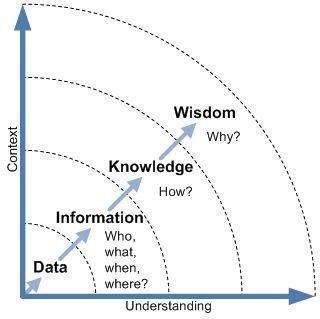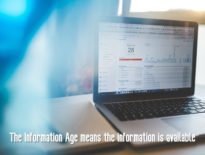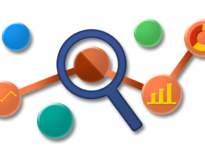
Not long ago, I shared a tweet that went a bit viral, noting that in our exuberance of things like “Big data” and “Machine Learning,” and through our Education system’s increasing focus on STEM, we’d do well in society to ensure merely that everyone has a basic understand of the data that’s available thanks to the internet.
Be that as an individual looking for work, an artist seeking their audience, an entrepreneur starting a business, or a company trying to wrap their hands around their venture, everyone can thrive with data and analytic being a core competency. After all, we’re in the “information age” for a reason.
Austin based Brett Hurt shares a few wonderful talking points and philosophies I want to encourage everyone to embrace. Founder of data.world, the mission of his work is to unlock the latent value of data (now only available to giants like Google) by making data and best-in-class data analytics technology universally approachable to universities, nonprofits and people around the world.

“People say that data is the new oil, but the truth is, it’s crude, unrefined and hard to find”
Brett Hurt with Jay Coen Gilbert in Forbes
Data is crude and hard [for most] to find. It’s there that I thought we’d explore what justifying how an investment in analytics looks. Why Analytics? From the root of the word, data analysis, is readily available and with even the smallest of data aggregated, you, your business, have no reasonable excuse not to be working from what you know.
You know.
While data can seem unwieldy, unavailable, or insufficient, the fact is that that core skillset we should teach everyone is that appreciate what to do with data is half the battle – and not that difficult.
An analogy comes to mind worth considering…
Imagine that your business is a car. You may have heard this notion before but I want you to play with again as I want to give a different perspective.
The fuel in the car is analytics. Refined oil.
That’s how I want to throw you for a loop – many of the car analogies in entrepreneurship refer to how advertising or sales is the fuel that accelerates the vehicle.
Nope. Sales is like stepping on the gas.
Step on the gas too much or at the wrong time and you slam into the car in front of you.
You have a car…
– The road is listening to your customers. You can take a right, go straight, or a left – one of those paths will get you where you want to go. The other paths CAN work, and thus customers can mislead; regardless, you need to listen to your customers and follow those roads or you’ll crash.
– The steering wheel is your team. Turn too much or too little and you’re in trouble. Turn the wrong way and there is no one to blame but yourselves.
– The map is your data. It’s not a roadmap nor plan as such things require your data, team, and customers working in conjunction to develop a plan. The map, in and of itself is data that tells you where you can go and what you can do.
So why is the gasoline your analytics??
Quite simply, because you don’t need it.
By all means, get out of the car and push.
With fuel in the car, you can make decisions more effectively and efficiently based on what we have in our car.
Tree Fine of SpyFu and Nacho Analytics, shared an implicit example.
You might say that your average customer value is $252.50 (the average of $5 and $500). Now, let’s say you spend 2 hours and $50 to get a customer to buy – be it from marketing, a sales team, or both.
In this scenario, it looks like $252.50 might actually be profitable. Great! I guess we can move on and mark this as a success. Right?
Best case: Average customer value = $500 (very profitable)
Worst case: Average customer value = $5 (time to close the doors)
So, what is it about average performance that makes it look good? Well, everything needs perspective, and this is what you lose – big time – when you don’t analyze each data point in the customer journey.
Without data, you don’t really know what makes half your customers buy a $5 product or service. The same goes for a $500 product or service.
And, without knowing that answer, you have zero control over how this might change in the future.
Without knowing that answer, you will never know if the $100k that is being spent on advertising is doing anything at all.
“The bottom line is that,” adds Fine, “without basing decisions on data, you are simply guessing. Typically, this results in many losses and a few wins. All in all, a huge waste of time and resources.
From my experience, if you aren’t moving up and to the right, you are headed for failure, and this should resonate with just about anyone that has interest in the business.”
I’d bold that entire quote but it seems silly to bold everything. Stress it in your mind that much.
In education, in business, the fact that EVERYONE isn’t being taught this as a fundamental of today’s world in and of itself explains why so many businesses struggle, working professionals are being left behind, and entrepreneurs take so many swings that miss.
Knowing What Matters
The fuel in the car is enables you to drive. You can still choose to turn left instead of right, ease off the gas, or follow Google Maps, but without KNOWING what to do you can’t possibly go any faster than your competition – you’re pushing your car.
Philosophically this is all sound and you’re going along with the ideas here. Still, what matters?
According to the Digital Analytics Association, “44% of analytics teams spend more than half their time accessing and preparing data rather than doing actual analysis.”
Why then should a business invest budget in data analytics if less than 50% of an analyst’s time is doing the actual business value of analyzing the data and improving the value of the business? Because most, even analysts, have no idea what even they should be analyzing. What paralyzes most is not that it’s Big Data, Analytics, nor insurmountable skills needed to mine data, it’s really just knowing where to start.

What everyone can and should know is what’s readily available. Long ago, given my focus on startups, I shared Google Analytics for Startups <- and that’s a handy and popular guide if you want to just get going on how to use Google Analytics to get at meaningful data that you should expect of your business. And in applying this crude visual to the left to your understanding of data as a startup, or any business, you can see how my encouragement of Analytics as a Startup aligns with How to Pitch – WHY is what matters and HOW justifies investments but you have to have the wisdom and knowledge from analytics to get there.
But that article explores the technical use of an analytics platform – it matters, but can we get more fundamental than that?
What are the objectives everyone should be driving?
#1: Acquire More of the RIGHT Customers
- How many customers have we acquired?
- How much do they purchase?
- What is our overall profitability?
- Where do we get more of those who are ideal?
#2: Marketing Attribution
- Is this message about our value proposition more effective than that message?
- People can’t click on a billboard or radio commercial so what impact did it have?
- We spent time at that conference in Detroit, how many people did we impact?
#3: Getting More from What we Have
- How and where might we upsell?
- From where are customers referring others?
- What is the frequency of audience engagement and how might we increase it?
#4: Growth From A/B Testing
- How quickly are we learning from and changing our approach to the top of the funnel? What are we learning, good and bad, to change the efficiency of what we’re doing to reach and influence more?
- How quickly are we learning from and changing the bottom of our funnel? From our sales process to our online conversion form, what are we learning every day that improves our conversion rate?
#5: Move Faster – step on the gas
- How are we aggregating data to accelerate adoption?
- What have we learned that determines where we go next?
- Are we identifying and removing what doesn’t work well and replacing it quickly with alternatives?
Simple questions. Fundamental questions. And keep in mind, whether you are an operating business or just someone hoping to thrive in work, you can ask and answer these questions, easily.
The data is crude. It’s complicated, oily, and tough to get out of the ground. But a lot of data is sitting right on the surface and there is really no excuse in today’s economy to not be familiar with getting at it and doing something about it. The days of making decisions because people think so are gone; it’s not called the information age because we lack the information, it’s so because humanity has made the investment to make data available to everyone – to level the playing field by enabling everyone to have it – how you thrive is by investing in yourself and doing something with it, because if you don’t,rest assured your competitors are.




Thank you for this! Sharing. I have flat out stopped working with clients that don’t expect this, and will never again work with an agency or web developer who doesn’t know it
Insanely helpful
Thank you!
“You have a car….The road is listening to your customers….The steering wheel is your team” Great piece! #startup #entrepreneur
I think about data on my birthday too. And code.
Tell em Paul O’Brien! I second this!
Such a giver…love it! Can’t wait to check this out and have an awesome birthday!!!